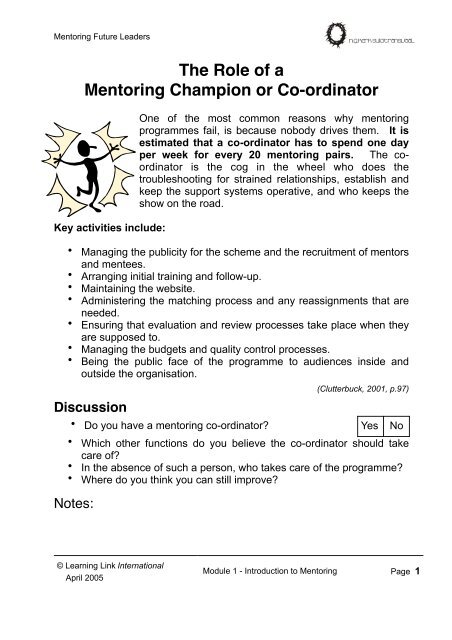Mentoring Future Leaders
You also want an ePaper? Increase the reach of your titles
YUMPU automatically turns print PDFs into web optimized ePapers that Google loves.
<strong>Mentoring</strong> <strong>Future</strong> <strong>Leaders</strong><br />
The Role of a <strong> </strong><br />
<strong>Mentoring</strong> Champion or Co-ordinator<br />
Key activities include:<br />
© Learning Link International<strong> </strong><br />
April 2005<br />
One of the most common reasons why mentoring<br />
programmes fail, is because nobody drives them. It is<br />
estimated that a co-ordinator has to spend one day<br />
per week for every 20 mentoring pairs. The coordinator<br />
is the cog in the wheel who does the<br />
troubleshooting for strained relationships, establish and<br />
keep the support systems operative, and who keeps the<br />
show on the road.<br />
• Managing the publicity for the scheme and the recruitment of mentors<br />
and mentees.<br />
• Arranging initial training and follow-up.<br />
• Maintaining the website.<br />
• Administering the matching process and any reassignments that are<br />
needed.<br />
• Ensuring that evaluation and review processes take place when they<br />
are supposed to.<br />
• Managing the budgets and quality control processes.<br />
• Being the public face of the programme to audiences inside and<br />
outside the organisation.<br />
Discussion<br />
(Clutterbuck, 2001, p.97)<br />
• Do you have a mentoring co-ordinator? Yes No<br />
• Which other functions do you believe the co-ordinator should take<br />
care of?<br />
• In the absence of such a person, who takes care of the programme?<br />
• Where do you think you can still improve?<br />
Notes:<br />
Module 1 - Introduction to <strong>Mentoring</strong> Page ! 1




